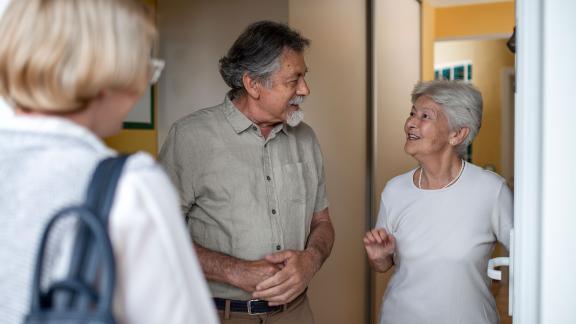Top ten tips for the care of older people: from the national clinical director

- Person-centred care The NHS, through the Long Term Plan recognises the importance of personalised care and this principal is still relevant during the pandemic.
- Age Discrimination Age is NOT being used to determine access to care and the message is that professionals support individual patients through good conversations to consider of the best care for that individual. This creates a joint decision and is based on creating an understanding of which treatments would benefit that individual and which would not.
- Access to Critical Care NICE created a rapid guideline around critical care which was amended last week to provide more clarification. This guideline recommended using the CFS (clinical frailty score) to help frame the conversation about access to critical care with patients and their families. Unfortunately I consider that this has been misinterpreted as a ceiling of all care in hospitals which is incorrect.
- Hospital Care Our experience is that older people have been accessing appropriate care in hospitals and some have been had good outcomes. Some may need supportive care and may after only a few days of exhaustion start to improve and be ready for discharge after 1-2 weeks. This was a recent press coverage about a 98 year old war hero who made a recovery and was transferred back to his care home.
- Palliative Care There are obviously older people who don't do as well and we know that the mortality rate is significantly higher in the over 70-year-olds. The NHS is set up to provide good care in the last days of life as it is in the first days of life and usually whether in hospital or out of hospital. The palliative guidelines for in hospital care were published five days ago and follow principals of good palliative care.
- Community Care We recognise that older people living in the community may feel vulnerable but general practice and community services are making changes in the way they operate to improve the ways they deliver care. The Community standard operating procedures and new General Practice standard operating procedures should make this clear. The challenge is making those changes work with reductions in staff across the whole sector. There are many stories of areas where more joined up care, digital technology and leadership is really helping support some of the challenges. We are also conscious that older people who may not have coronavirus but other conditions still need to be supported and this may be more challenging when the system is more focused on COVID-19 patients. We are working with stakeholders like BGS to support front line clinicians in managing these patients. NICE has developed rapid guideline to support professionals managing people in community.
- Care Homes We recognise that many care homes are feeling more isolated. They have felt let down a lack of access to supplies of PPE, as well as other issues. However, we now know that issues have started to be addressed. Most have now received initial supplies of PPE and more are on their way. My own experience of working with care homes in Windsor is that they have also been receiving support from the local system and problems are being addressed at a local level to ensure residents continue to be supported. There is now published guidelines for care homes.
- Palliative Care There are further palliative care guidelines, which also take into account ethical considerations, drafted by Prof Bee Wee to specifically support general practice, community teams and carers managing COVID-19 patients who are in their last days of life. This guidance has taken into account the changes to the standard operating procedures for primary care and community care due to COVID-19 and a good example of integrated care.
- Palliative Care medication has been considered within this guidance and there is confidence that if people are dying in the community whether at home or in a care home setting that they shall be supported using appropriate medication to their condition and taking into account supply issues.
- Death Legislation has now been passed to support managing the dead with respect and dignity through the Coronavirus Act
Dr Adrian Hayter
National Clinical Director for Older People and Integrated Person-centred Care
NHS England and NHS Improvement



